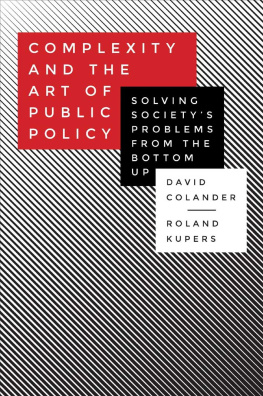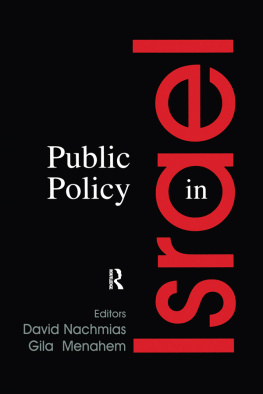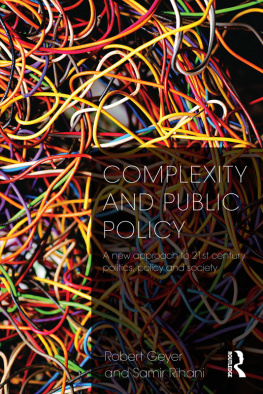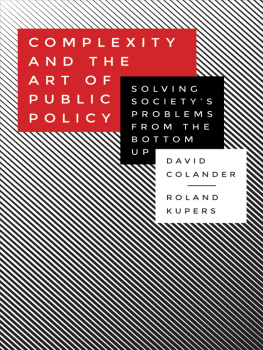COMPLEXITY AND THE
ART OF PUBLIC POLICY
COMPLEXITY
AND THE ART
OF PUBLIC
POLICY
Solving Societys Problems from the Bottom Up
DAVID COLANDER AND ROLAND KUPERS
PRINCETON UNIVERSITY PRESS
Princeton and Oxford
Copyright 2014 by Princeton University Press
Published by Princeton University Press, 41 William Street, Princeton, New Jersey 08540
In the United Kingdom: Princeton University Press, 6 Oxford Street, Woodstock, Oxfordshire OX20 1TW
press.princeton.edu
All Rights Reserved
Library of Congress Cataloging-in-Publication Data
Colander, David C.
Complexity and the art of public policy : solving societys problems from the bottom up / David Colander and Roland Kupers.
pages cm
Includes bibliographical references and index.
ISBN 978-0-691-15209-7 (alk. paper)
1. Economic policy. 2. Complexity (Philosophy) 3. Evolutionary economics. 4. Policy sciences. I. Kupers, Roland, 1959 II. Title.
HD87.C65 2014
339.5dc23 2013038771
British Library Cataloging-in-Publication Data is available
This book has been composed in Slate Pro and Verdigris MVB Pro
Printed on acid-free paper.
Printed in the United States of America
10 9 8 7 6 5 4 3 2 1
CONTENTS
ACKNOWLEDGMENTS
As we discuss in the first chapter, this book was the product of serendipitythe two of us finding ourselves on a flight together and discovering how closely our views meshed. Of course serendipity is seldom fully serendipitous, and had Carlo Jaeger, of the Potsdam Institute for Climate Impact Research, not invited us both to the climate policy conference in Berlin, we would have never met. So in many ways Carlo put us together. Carlo, early on, saw the implications of complexity work for policy and after reading one of Daves books on complexity called Dave out of the blue when he was at Princeton and convinced him to become one of the organizers of the transdisciplinary Dahlem Conference on the role of mathematics and modeling in the social sciences. Earlier Roland had worked with Carlo on a study on behalf of the German government that took a complexity view on the economics of climate change policy in Europe. Few academics have the breadth and insight of Carlo; he represents, in many ways, what we have in mind when we discuss in forming a creative transdisciplinary social science where researchers are comfortable with the highest level math, but equally comfortable with what Nicolas Georgescu Roegan called dialectic conceptsconcepts that blend into others and, applying current technology, require a humanist culture to contextualize.
Once we started writing, we passed drafts on to many friends and acquaintances, and presented our ideas at numerous conferences and forums. Dave would especially like to thank David Horlacher, Brian Arthur, Katy Delay, Ric Holt, Barkley Rosser, and the students of Daves history of thought classes at Middlebury, who had lively discussions of early versions of the historical overviews. Katy, in particular, went through some chapters line by line from a sophisticated free market supporters view and improved the exposition. Another person Dave would like to thank is Buz Brock, with whom Dave has discussed many of the ideas here as they were contemplating writing a more technical book on the same theme. They never quite got around to it, but discussing any idea with Buz is always enlightening, and his ideas about how complexity science can guide policy are to be found throughout the book.
Roland would especially like to thank Angela Wilkinson, who helped frame the arguments through many discussions about integrating irreducible uncertainty into policy and management. Thanks go to the Smith School of Enterprise and the Environment at Oxford for generously extending a fellowship to Roland during the writing of this book. The feedback from students while teaching a Sciences Po MPA class on complexity and public policy together with Diana Mangalagiu was very valuable. Also special thanks to Fred Lachotzki, Luciano Pietronero, Alexander Rinnooy Kan, Sterre van Leer, Laurenz Baltzer, and Yongsheng Zhang. Thanks to Jan Vasbinder and Ann Florini for reinforcing the complexity and policy link in Singapore. Finally Roland would like to thank his father, whose genuine curiosity about the boundaries of economic policy, after a career as a diplomat and an economist, is a continuing source of inspiration.
Once we decided to write the book, we contacted Peter Dougherty and Seth Ditchik at Princeton University Press, and they provided helpful advice on the audience and level at which we approached the book. They also played a central role in choosing a title for the book. As the book progressed, Beth Clevenger helped guide it along. The copy editor, Joseph Dahm, did a great job.
Finally we want to thank our wives, Patrice and Hester, who were supportive of the project even though it meant that our minds were often focused on abstract ideas of complexity rather than the real-world complexity that fills out everyday life.
PART I
The Complexity Frame for Policy
CHAPTER 1
Twin Peaks
The ideas of economists and political philosophers, both when they are right and when they are wrong, are more powerful than is commonly understood. Indeed the world is ruled by little else. Practical men, who believe themselves to be quite exempt from any intellectual influence, are usually the slaves of some defunct economist.
J. M. KEYNES
Traveling from Amsterdam to Johannesburg on business, one of us settled into his seat and opened up the Economist magazine. Because of the mountainous terrain below, he knew that the flight would likely be rough, as the hot air from the plains rose above the mountainous terrain below and slammed into the colder upper layers of the atmosphere. Luckily, this flight was smooth as the pilots were outrunning the turbulence. Settling back into his seat he started reading an article about the others work:
In 1996, David Colander of Middlebury College, in Vermont, expressed his dissatisfaction with decades of economics by invoking a lofty analogy. He felt macroeconomists had clawed their way up a mountain, only to discover, when they broke through the clouds, that a neighbouring mountain would have taken them higher.
Mr. Colanders analogy does not imply that economists are getting nowhere: they can make progress up their chosen peak, even if other, higher mountains beckon. Mainstream models of the macroeconomy, for example, are more sophisticated than they were, allowing for different kinds of shocks, better statistical testing and a variety of dramatis personae beyond the economic Everyman of yore. This progress is the result of hard theoretical work in response to successive rounds of criticism. The critics, who dont think the climb is worth the effort, may not always appreciate quite how far the leading economists have ascended.
The twin peaks image has a further, unsettling, implication. To get from one peak to the other, economists will have to lose a lot of altitude first. To tackle questions in a fresh way, they may have to set aside many of their favourite techniques and methods. This prospect probably explains a lot of the resistance to new economic thinking. Economists tend to cling to whatever assumptions are required to use the techniques they favour.
Not long after that, the two of us met at a climate change conference in Berlin, and we both had the same reaction to much of the discussion; it missed many of the central elements of policy. The policy discussion was framed between two polar options: either leaving it to the market or counting on government for the solution: either laissez-faire or government activism. What these approaches miss is that those very choices will themselves influence the dynamics of the system, as well as peoples tastes and preferences. It wont be the same system once the policies are under way, and that very fact can bring about both opportunities and unforeseen consequences.
Next page










